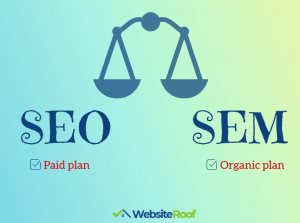
SEO vs. SEM: Difference and Strategies
SEO vs. SEM: Which one is better? Which one should I use for my website? Here we have got all the answers to your concerns.
It is better to know the difference between SEO and SEM, the two primary terminologies that are used in advertising and marketing. We are talking about the contrast between SEO and SEM. The primary terms of Search Engine Optimization and Search Engine Marketing. The detailed differences between SEO and SEM will be listed out in this article. Websiteroof will give you a clear understanding of the definition and use of each of both SEO and SEM.
Primary Difference:
The primary difference between Search Engine Optimization (SEO) and Search Engine Marketing (SEM) is that SEO is more focused on the optimization of the website, it also generates more traffic from organic searches. In the contrast, the target of Search Engine Marketing (SEM) is to attract traffic from organic searches as well from the paid searches.
What is SEO?
Basically, Search Engine Optimization or SEO is the process included in search marketing. SEO uses organic tactics to become more visible in the Search engine results pages (SERP). In SEO, the brands do not use the paid advertising a variety of techniques and strategies are used to show the content of the particular site on the internet. SEO strongly uses organic techniques. The techniques are categorized in the White hat SEO, black hat SEO, and grey hat SEO. The most preferred SEO is a white hat. The tactics used in this SEO are:
- On-page SEO: The on-page SEO does the optimization of an individual page, it targets the specific keyword and enhances the search results. The strategies in the On-page SEO include keyword optimization.
- Technical SEO: The technical SEO does the improvement in the backend. These changes are related to the speed of the website, mobile compatibility, indexing, site building, structuring of data, and security. Through technical SEO, the user experience increases, which leads to a higher ranking of the website.
- Off-page SEO: Off-page SEO covers the reputation building of the website by attaching to high-quality websites. The techniques included in the Off-page SEO are link building, outbound links, inbound links, and local SEO.
SEO Ranking Factors:
The most asked question is about the ranking factors, the primary SEO ranking factors are:
- A Secure and Accessible Website.
- Page Speed (Including Mobile Page Speed)
- Mobile Friendliness.
- Domain Age, URL, and Authority.
- Optimized Content.
- Technical SEO
- User Experience
- Links (link building)
- Real information
What is SEM?
Search Engine Marketing (SEM) is a term that is derived from SEO, and it includes SEO. All the features and techniques that apply to SEO, they are all applied to the SEM. Whereas, the SEM includes Price Per Click (PPC). The paid SEM strategy involves the setup of ads and optimization of the site as well. It can be concluded that SEM is a subset of digital marketing, whereas it includes the paid searches that help in the ranking of the website. There are also options to do Google SEM. The key strategies used in the SEM are:
- Launching ad campaigns: This strategy includes the launching of various ad campaigns that are paid.
- Targeted keywords ads: Creating ads that consist of targeted keywords.
- Monitoring metrics: It includes the clicks, searches, Cost-per-click, click-through rates, and impressions
SEM Activities:
Other terms used to refer to SEM activities:
- Paid ads
- Paid search advertising
- PPC (pay-per-click)
- CPC (cost-per-click)
- CPM (cost-per-thousand impressions)
Most searched ads are sold on a CPC cost per click / PPC basis, but some advertising options may be sold on a CPM basis.
Similarities:
- SEO and SEM both coexist on the same channel – The search channel
- They boost brand awareness regardless of whether you get any clicks
- Both target specific keywords.
- Both help a website appear in search results.
- SEO and SEM both require testing and continual optimization.
- Both require knowing your audience.
- SEM and SEO Both have the same function which is to generate more traffic to a website.
- Both use keyword research to uncover popular search terms.
Differences:
- SEO has a higher click-through rate (CTR) than SEM.
- SEM search placements include an “Ad” designation while SEO does not.
- SEM search results have ad extensions but SEO search results have featured snippets.
- The impact of SEM is immediate, not like that SEO takes time.
- You pay each time a user clicks on an SEM result however you pay nothing when a user clicks on an SEO result.
- SEM results show to a select target audience compared to SEO results.
- SEM is better for testing than SEO.
- SEO adds value over time yet SEM does not.
Which one is better: SEO vs. SEM?
After the above differences and details, basically, SEO is a component of the SEM. We cannot optimize the SEM without SEO. As, SEO is of immense importance, as it is organic and provides natural responses rather than ads. We suggest to go for the SEO first, and then opt for the SEM strategies. You should focus on the SEO first, as it lays the foundation for the SEM.
Being a website builder and hosting provider, we would suggest that organic SEO is the best approach, but as it is visible that, true SEM cannot be succeeded without the use of organic SEO. Finally, once you understand the difference between SEO Vs. SEM, it is important to evaluate your specific needs to target them with the right tool and switch between them according to your short term goals.




